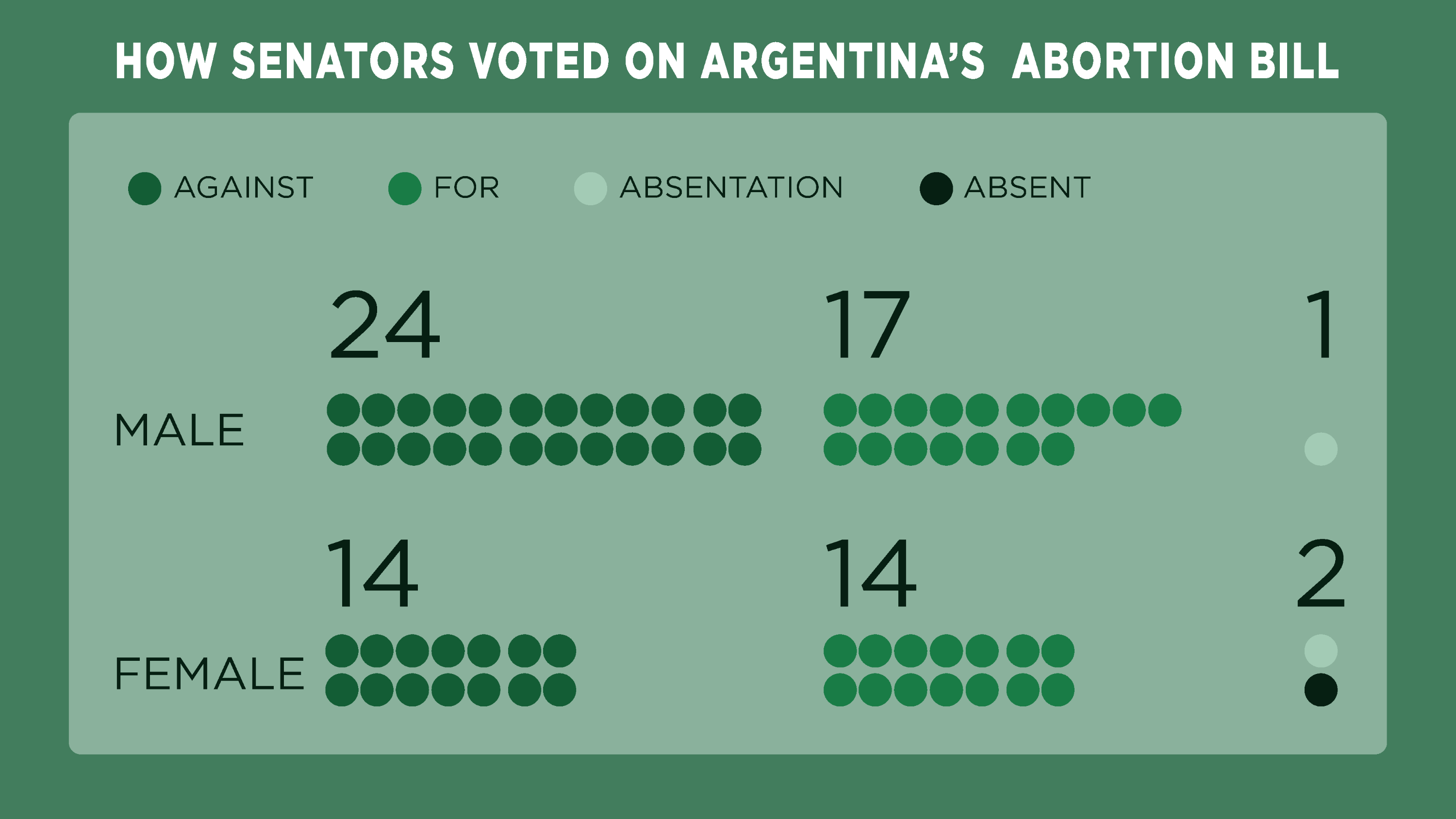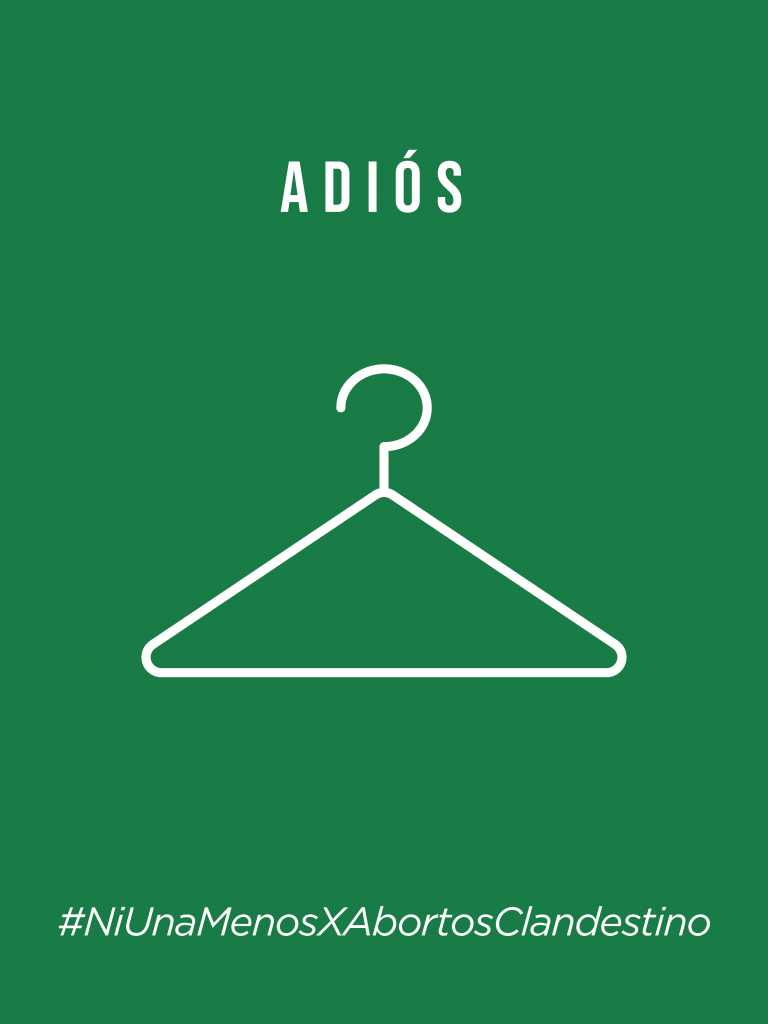
On August 9th, 2018 Argentina’s Senate rejected the landmark bill that sought legalization of abortions in the first 14 weeks of pregnancy. Argentinian lawmakers debated the complete legalization of abortion for more than 15 hours and voted 38 against to 31 for. From the senate, 14 female and 24 male senators voted against the bill. Despite massive public support for a bill with the potential to decriminalize abortions and thereby prevent deaths in the figures of tens of people every year, it was struck down.
FIRST DEATH
The failure of the bill claimed its first casualty on the 16th of August. A woman passed away as a result of a botched home remedy. The woman, referred to as Elizabeth, tried to use parsley in an attempt to induce a miscarriage. This resulted in septic shock and infection. She was transferred to a hospital and her uterus was removed in an attempt to save her life, but she died a few hours later. Elizabeth was the mother of a 2-year-old son and had previously undergone two illegal abortions.
HISTORY
Since the late nineteenth century, abortion has been listed as a crime in Argentina. The current penal code had entered into force in the 1880s, with the last amendment being made only in 1984. Now, abortion is illegal in Argentina except in cases of rape or when the life or health of the woman is at risk. Even in these cases, abortions are hard to obtain since there are no clear guidelines on how to go about the legal process. Some service providers deny the request of abortion for fear of committing a crime. Several Argentine women have spoken about mistreatment from medical professionals and having to comply with high monetary demands to carry out the medical procedures.
Six bills have been presented to the Argentine Congress over the past 13 years that would decriminalize abortion, with little success. These previous bills did not garner enough signatures to reach a quorum for open debate. A protest movement addressing violence against women gave space for this broader debate about women’s rights in Argentina, including abortion. The Bill to decriminalize abortion in Argentina was introduced yet again by President Mauricio Macri. Despite being strongly opposed to abortion, he promised to not veto the bill if it were to be passed by the Senate.
STATS
According to Argentina’s Ministry of Health, in a population of approximately 44 million people, 500,000 clandestine or illegal abortions are performed each year. In 2016 alone, 43 women died from clandestine abortion procedures which turned fatal – making it the leading cause of maternal mortalities in the country. Those who can afford drugs use them to medically carry out abortions while poorer women resort to more crude methods. Findings by BBC show that there is a greater search interest in abortion pills in countries whose abortion laws are more restrictive. Buying pills online and through WhatsApp groups is the face of modern “DIY abortions”.
“DIY” ABORTIONS
There are two ways in which an abortion can be carried out- a medical abortion or a clinical (surgical) abortion. A medical abortion is carried out via a combination of pills Misoprostol and Mifepristone that induce a miscarriage. These are meant to be administered by a medical professional. The BBC reported a WhatsApp group that helps women acquire pills needed for abortions and is a sort of support group for many of them. “What I thought was really nice, is how the other women in the group help each other, sharing information, and discussing doubts and fears. This strengthened me, in a way.” said Juliana (name changed) to BBC. “It’s always good to know that you’re not alone. The group was very important to me, for me to feel safe.”
Searches related to “home remedies” to self-induce abortions are also popular in countries with restrictive abortion laws with items like aspirin, vitamin C, parsley, cinnamon, and abortion teas.

All of these “home remedies” have been listed as unsafe abortion methods by the World Health Organisation as women are unable to control the dosage and side-effects.
Even medically induced abortions, when not administered by professionals, not only have a higher failure rate but also pose a risk to a woman’s well-being.
“Even when the quality of the drugs is perfect and you follow the protocol to the letter, there is still a failure rate,” said Dhammika Perera, the global medical director at Marie Stopes International.
NI UNA MENOS
Across Latin America, 97% of women live in countries with restrictive abortion laws. The bill put in motion was part of a broader women’s rights movement, “Ni Una Menos” — meaning “Not One Less” — directed at stopping violence against women. The movement began in Argentina in 2015 as a campaign against gender-based violence. Later, it spread to more Latin American countries as cases where men were violent to their partners came out. Activists see making abortion illegal as another way to suppress women. Argentina has a history of public protest and multiple Ni Una Menos marches have taken place, even causing roads to be shut down.
When the bill was taken into consideration, Argentine President Mauricio Macri called for Congress to debate the abortion issue earlier this year, over the opposition of the Catholic Church, which is still a major force in Argentina and Latin America. Macri personally is anti-abortion and has distanced himself from any further public comments.
DEMONSTRATIONS
Thousands stepped out into the streets of Buenos Aires; pro-choice activists clad in green pañuelos (bandanas). The bandanas are the symbol of the National Campaign for the Right to Legal, Safe and Free Abortion which was started in 2005. They work from the perspective of public health, ensuring social and sexual liberty and especially for ensuring the human rights of women. Under the hashtag #NiUnaMenosXAbortosClandestino (#NotOneLessXClandestineAbortions) gender rights activists demanded the passing of the bill seeking to decriminalize abortions and give women free, safe and legal abortions up to the 14th week of conception. Many of the abortion rights supporters carried around signs of hangers against the green background – a stark but traditional symbol for unsafe abortions.
RELIGIOUS OPPOSITION – “LET’S SAVE BOTH LIVES”
Home to Pope Francis, many Catholic citizens of Argentina are anti-abortion or ‘pro-life’, including Pope Francis and President Mauricio Macri who himself got the cabinet to discuss the bill. The strong opposition of the Catholics and Pope Francis towards the bill decriminalizing abortions lies in their “respect” for human lives.
“It’s not about religious beliefs but about a humanitarian reason,” said Cardinal Mario Poli, the archbishop of Buenos Aires, “Caring for life is the first human right and the duty of the state.”
While many anti-abortion activists have their beliefs founded in the “preservation” and “respect” for life, many seem to fall silent on the matter of deaths caused by failed abortions. Guillermo Marcó is the former spokesman of the Argentine pontiff, who said that while the Pope echoes similar anti-abortion sentiments as the President, he does not agree with him politically. “He does not agree with President Macri’s approach, which is letting people decide. In life there are principles and values – it’s not about opinions.”
Jael Ojuel is a doctor and an evangelical. She publishes videos on social media, preaching and advising women about what she believes is their purpose in life. In a statement made before the declaration of the bill’s failure, she said that if the bill were to pass she would refuse to perform abortions, “The rights of a woman end when the rights of the embryo or the foetus that’s growing start,” she argued.
Anti-abortionists, during their own demonstrations, adopted the slogan “Let’s save both lives”.
Y así los senadores y anti derechos hoy se van a ir a dormir felices de que le salvaron la vida a personas que no existen, literalmente hablando, y lucharon porque sigan muriendo mujeres. Tranki la #EstupidezCompleja
— malena pichot (@malepichot) August 9, 2018
After the failure of the bill in the Senate, comedian and legal abortion activist Malena Pichot tweeted out “Senators and anti-rights can go to sleep pleased that they saved the lives of people who literally speaking do not exist and pleased that they fought for women to keep dying,”
The National Campaign for the Right to Legal, Safe, and Free Abortions said, “Every death from an abortion will now be the responsibility of the National Executive Power and the 40 senators who abstained or voted against our right to life, to health and the recognition of our dignity.”
What next?
On the 9th of August, when the bill failed, many anti-abortion activists celebrated as firecrackers lit the sky. Despite the failure of the bill to legalize abortions, many women and pro-choice activists remain optimistic. Their seventh attempt at getting the bill to be debated over was a huge success and several women have spoken out about not giving up. With regard to the decriminalization of abortions, Mariela Belski, executive director of Amnesty International Argentina, stressed that the Senate vote was a “stepping stone” and “not a setback” for Argentinians’ abortion rights.
Article by Anushka Chhikara and Karthika Venugopal
Featured image and graphics by Mayank Kashyap




Leave a Reply
You must be logged in to post a comment.